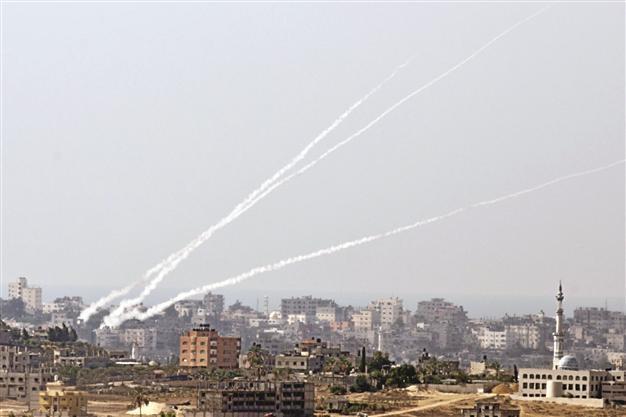Israel, Hamas truce in effect
GAZA CITY

A trail of smoke is seen as a rocket is launched from the Palestinian Gaza Strip toward southern Israel. A Palestinian boy (inset) views the body of a Palestinian militant throughthe window of Bait Hanon hospital in northern Gaza. AFP Photo
The skies over Gaza were quiet yesterday as an Egyptian-brokered truce between Israel and Hamas took hold after a spurt of violence left four Palestinians dead and two workers wounded in Israel.An Israeli military spokeswoman told Agence France-Presse there had been “no rocket fire at Israel nor any Israeli attacks in the Gaza Strip since Oct. 24 night.” In Gaza, Palestinians officials also confirmed a quiet night without any air strikes, although a militant group called the Mujahedeen Brigades claimed to have fired three rockets over the border.
Military and police sources said they were not aware of the incident, but the army later said one rocket had hit southern Israel. Israeli schools near the border were operating as normal, public radio said, after being closed for the day due to heavy rocket fire which began on Oct. 23 night and sparked a brief but deadly confrontation between militants and the Israeli army.
Late on Oct. 24, Israeli and Palestinian officials said an Egyptian-brokered cease-fire would go into effect at midnight. The agreement was aimed at ending 24 hours of bloodshed, which saw Israeli air strikes kill four militants and armed groups firing more than 70 rockets and mortars across the border, seriously wounding two Thai workers.
Among those firing on Israel was the armed wing of Gaza’s ruling Hamas movement, the Ezzedine al-Qassam Brigades, which said three of the dead were its own militants. The latest surge in violence began on Oct. 23 evening, shortly after a top-level state visit to Gaza by the Qatari emir to inaugurate a multi-million dollar project to rebuild the Palestinian enclave. During the evening, militants fired six rockets at Israel and in response Israeli aircraft killed two Hamas militants in raids on northern Gaza, prompting a further wave of rocket fire.
Hamas officials said the emir urged Hamas to do everything possible to avoid violence with Israel. Israel’s foreign minister, Avigdor Lieberman, suggested the visit had the opposite effect.
“I think what we see [with] the visit of the emir of Qatar in Gaza [is] clear support for terror and terrorist activity,” he said at a news conference with the visiting EU foreign policy chief, Catherine Ashton.
In his meeting with Ashton, Israeli President Shimon Peres charged that Qatari money was funding Hamas attacks. “No one in the world could agree to the current situation” of repeated rocket salvos, Peres said.
But Hamas spokesman Fawzi Barhoum accused Israel of trying to raise tensions, saying Israel was upset about the “political and economic gains” reaped from the emir’s visit, and wanted to “disrupt the atmosphere ahead of the holiday.”
“Hamas will receive its punishment for what has happened here,” Israeli Defense Minister Ehud Barak said, and Prime Minister Benjamin Netanyahu also warned that any continuation of rocket fire would prompt a “much more extensive” Israeli response.
Sudan dangerous terrorist state: Israel
KHARTOUM - Agence France-Presse
Sudan is a “dangerous terrorist state,” a top Israeli defense official said yesterday after Sudan accused Israel of carrying out a deadly missile strike on a military factory in Khartoum.
Sudanese officials say the attack on the Yarmouk facility south of Khartoum, which took place at around midnight on Oct. 23 and killed two people, was carried out by four radar-evading aircraft.
Israel, which has long accused Khartoum of serving as a base of support for militants from the Hamas movement which rules Gaza, has refused all comment on the claim. “Sudan is a dangerous terrorist state. To know exactly what happened (there), it will take some time to understand,” Amos Gilad, who serves as director of policy and political-military affairs at the defense ministry, told Israel’s army radio. “Sudanese President Omar al-Bashir is regarded a war criminal. Sudan has also served as the operational base for (the late Al-Qaeda chief Osama) bin Laden,” Gilad pointed out.
Khartoum has said it found evidence of Israeli involvement among the remnants of the explosives at the blast site. “We think Israel did the bombing,” Culture and Information Minister Ahmed Bilal Osman said, adding: It is not the first mystery blast which has prompted allegations of Israeli involvement. In April 2011, Sudan said it had irrefutable evidence that Israeli attack helicopters carried out an air strike on a car driving along its Red Sea coast.
















